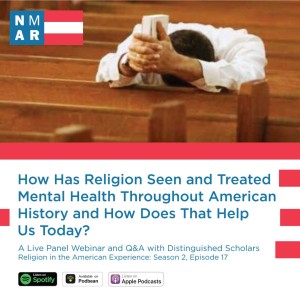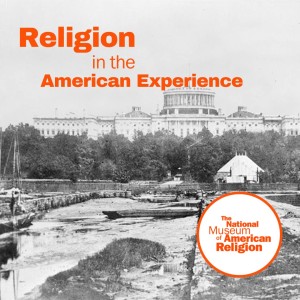
There seems to be some sort of mental health crisis, especially among younger people, in the United States – with many experts blaming social media. Teen suicide is in the news, depression seems to be an ever-growing menace. Then COVID hit last year, which has exacerbated the problem.
Mental health has a special place as seen through the lens of religion – the sicknesses one can’t see, the depression, the darkness, all things “of the soul” are things religion naturally addresses.
At the Museum, we believe it will be instructive for all of us to better understand how religion has seen and addressed mental health throughout U.S. history so that we are better equipped to address the mental health challenges of our present moment.
This morning we have a fantastic panel of scholars:
Dr. Judith Weisenfeld, Agate Brown and George L. Collord Professor of Religion at Princeton University. She is the author of Hollywood Be Thy Name: African American Religion in American Film, 1929-1949, African American Women and Christian Activism: New York’s Black YWCA, 1905-1945, and New World A-Coming: Black Religion and Racial Identity during the Great Migration. Her current research examines the intersections of psychiatry, race, and African American religion in the late 19th and early 20th centuries;
Dr. Andrew Walker-Cornetta, Postdoctoral Research Associate at the John C. Danforth Center on Religion and Politics at Washington University in St. Louis. His research focuses on how religious communities have shaped the history of disability in the United States. In August, he will begin a position as Assistant Professor in the Department of Religious Studies at Georgia State University.
Dr. Barbara McClure, Associate Professor of Pastoral Theology and Practice at Brite Divinity School at Texas Christian University, and author of Emotions: Problems and Promise for Human Flourishing. Her primary interests lie primarily in the meaning of and means toward human flourishing, respecting both the fractured character of human nature and the religious impulse for wholeness and coherence;
Dr. Kameelah Rashad, Founder and President of Muslim Wellness Foundation (MWF) and the founding co-Director of the National Black Muslim COVID Coalition. She is a Visiting Assistant Professor of Psychology and Muslim Studies at Chicago Theological Seminary;
And, Dr. Elizabeth Hayes Alvarez, Associate Professor of Religion at Temple University, and author of The Valiant Woman: The Virgin Mary in Nineteenth-Century American Culture. She is currently a Scattergood Fellow working on a book entitled Challenging the Great Physician: Christian Responses to the Rise of Psychiatry in America.
More Episodes
 2021-07-05
2021-07-05
 162
162
 2021-06-08
2021-06-08
 291
291
 2021-04-26
2021-04-26
 136
136
 2021-04-12
2021-04-12
 143
143
 2021-03-29
2021-03-29
 117
117
 2021-02-08
2021-02-08
 158
158
Create your
podcast in
minutes
- Full-featured podcast site
- Unlimited storage and bandwidth
- Comprehensive podcast stats
- Distribute to Apple Podcasts, Spotify, and more
- Make money with your podcast
It is Free
- Privacy Policy
- Cookie Policy
- Terms of Use
- Consent Preferences
- Copyright © 2015-2024 Podbean.com






